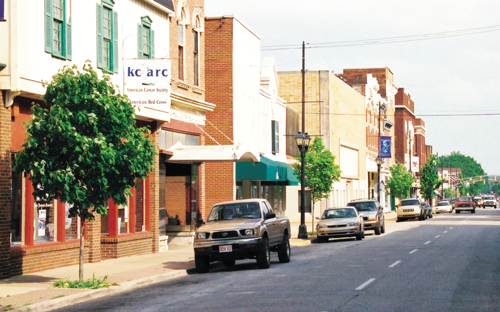Community Profile: Historic Vincennes, Ind., Draws Strength from Within
Photo Gallery | Article
Photo Gallery

The George Rogers Clark Memorial honors an important piece of Vincennes' history.

The Lincoln Memorial Bridge spans the Wabash River into Illinois.

Small businesses line Main Street.

Children listen and learn at a day-care center operated by KCARC.
Vincennes sits serenely along the banks of the Wabash River, a sight in contrast with the most significant event ever to occur in this oldest of Indiana towns. The landscape was anything but peaceful in February 1779, when Col. George Rogers Clark led an army into Vincennes and captured the British stronghold of Fort Sackville. This little-known, but strategic, Revolutionary War battle aided the United States in laying claim to a vast area in the West. Ultimately, a striking 80-foot granite and marble memorial would be erected downtown to honor Clark's conquest.
More than 220 years later, this town is once again looking to create noise—not the kind that comes from cannons blasting and muskets firing, but that of factories churning and cash registers ringing. City leaders hope to put an end to the economic cease-fire that has beset the community over the past year.
"Since Sept. 11, it has been real quiet," says Chris Kinnett, president and CEO of the Knox County Development Corp. (KCDC), whose task it is to lure new business to the area. "We're having to dig a little deeper and take a look around at other opportunities."
Vincennes is already capitalizing on some homegrown opportunities to attract industrial suitors and to keep its economy from suffering the same fate as the British troops at Fort Sackville.
The Right Path
About 40,000 people live in Knox County, which boasts diversified, if not thriving, industries in manufacturing, agriculture, health care and education. The unemployment rate is a relatively low 3.4 percent, but that is up from 2.9 percent last October. To turn the tide, Kinnett says his organization is targeting the automotive industry "for obvious reasons."
To understand why these reasons are so obvious, drive 25 miles south to Princeton, Ind., home of a massive Toyota plant—one of only two vehicle-manufacturing sites the Japanese automaker operates in the United States. The plant opened in 1998 and has spawned satellite suppliers nearby, including a pre-Sept. 11 coup for Vincennes—a 125,000 square-foot facility set to open this month in the town's industrial park. Futaba Indiana of America Corp. will make door frames for Toyota's Sienna minivan and employ about 70 people by next year.
To assist companies like Futaba in coming up with the strongest list of job candidates possible, the KCDC partnered with Vincennes University four years ago to create a program called Pathways. For a $20 fee, Pathways participants take a four-hour standardized battery of tests, which measures everything from math aptitude to eye-hand-foot coordination to job temperament. The assessment results are then placed in a database that hiring businesses can review. Brent Woolwine, a Pathways coordinator at the university, says about 2,000 names are in the Pathways database.
Woolwine says the catalyst for the creation of Pathways was Toyota, which manages its own skills-assessment program. Realizing that Toyota was attracting high-quality employees through its screening process, county officials created Pathways to help other local companies match the best person for a position.
Measuring the skills of its labor pool ought to give Knox County an edge over its competitors, Woolwine says. "We can say to prospective companies or companies in town that are looking to expand, ‘Yes, we have a group of people here who are capable and ready to do the job you require.' "
Woolwine calls the Pathways assessment a "working man's transcript" because, like a college transcript, it offers an employer third-party verification when comparing one candidate's qualifications to another's. Some applicants even attach their Pathways assessment to their resume in the hopes that the form will be the determining factor in improving their employment situation.
"We determined that we had a significant amount of underemployed people who had a job, but wanted a better job," Woolwine says. "They didn't know how to get from McDonald's to Gemtron," the largest manufacturer in town. "Pathways gives them a method. Also, through Pathways, they will be looked at by more people than they ever would otherwise."
Test-takers who rate poorly in a particular area are directed to federally funded adult education programs to help them improve their skills. Most of the major manufacturers in Knox County use Pathways when filling open positions, Woolwine says. That includes Gemtron, which makes molded glass products for appliances like refrigerators.
Says Dale Biehl, business manager at Gemtron: "We are very excited about Pathways. It has enabled us to see if prospects fit our needs. Plus, our retention rate is higher now."
A Unique Agency
On the north side of town, 400 people once worked at a 230,000-square-foot facility. Among other things, these employees of Johnson Controls produced seat frames for Jeep Cherokees. In 1995, the company closed the plant. Smaller manufacturers moved into the site over the next few years, but they did not last. By the year 2000, the building stood empty.
Today, an agency called KCARC is breathing new life into this site. KCARC stands for Knox County Association for Retarded Citizens, but the organization always refers to itself by the acronym—and not just because it is shorter. Mike Carney, executive director of the private, nonprofit agency, says the spelled-out name is misleading because KCARC now serves people of all types of disabilities, as well as many without disabilities. Started in 1972, KCARC is one of more than 50 ARCs in Indiana and about 1,050 nationally.
KCARC employs about 400 people at 28 different facilities, including a day-care center, a special child-care center for sick or injured children and housing programs throughout the county. But what makes Knox County's ARC unique, according to Carney, is its five production plants, like the one on the north side of town. Carney says that when it comes to manufacturing, no other ARC in the state can match what KCARC is doing.
"Several ARCs have what you would call sheltered workshops, where people are sitting around tables doing small sub-assembly work. And there's nothing wrong with that," Carney says. "Our operations, however, are far more sophisticated."
In the five KCARC plants, disabled and non-disabled people produce a variety of finished goods for the private and public sector. The goods include conference tables for the General Services Administration, long underwear for the Department of Defense and front grilles for certain Ford trucks.
"ARCs are usually viewed as a social service agency," Carney says. "But in this community, KCARC is a major economic asset and important for the community's well-being. We make products, we sell them, and we get paid for them."
Recently, KCARC added a piece of business at the former Johnson Controls plant. It has contracted with the U.S. Department of Agriculture to package and ship powdered milk. As a result, KCARC plans to hire an additional 50 employees.
"We Are Educating People"
Purdue, Notre Dame, Indiana…these are just a few of many highly acclaimed universities in the state of Indiana. In that light, it is all the more surprising that a 1998 study by the Indiana Fiscal Policy Institute found that Indiana ranked 48th out of all states in terms of residents with a four-year college degree.
"We are educating people," says Jim Bobe, president and CEO of First American Bank in Vincennes. "It's not like we're a bunch of dummies. But one of our biggest challenges is keeping our young people here."
Besides trying to lure more specialized and technical companies to Indiana, the state decided that a way to stem the brain drain is to expose more of its citizens to higher education through a statewide community college system. This effort centers on Vincennes University, a two-year institution that is the state's oldest university. VU was founded in 1801 by William Henry Harrison, later to become the ninth U.S. president.
In 1999, VU partnered with Ivy Tech State College, a technical school with 23 locations in the state, to begin phasing in a community college system. Essentially, the union marries VU's expanded liberal arts curriculum with Ivy Tech's broad physical reach and technical programs. As a result, more students will be able to earn associates degrees that will transfer more easily to one of the state's four-year institutions.
"When we compared ourselves with states that do have a well-educated citizenry and higher median incomes, almost all of those states had community college systems," says Jim Messmer, acting vice president for statewide services at VU.
After two years, 10 of the 23 Ivy Tech locations are offering VU courses and degrees, with four more planning to do so in the upcoming academic year. Enrollment is up 17 percent at those 10 locations, Messmer says. Affordability is another attraction. The state froze tuition during the first two years of the partnership and funded cost increases out of the state budget. Because Indiana, like most states, is facing a budget crisis, it has scaled back funding for education. Therefore, the tuition freeze was lifted for the coming year.
Vincennes, Ind., by the numbers
| Population as of 2002 |
39,186
|
| Labor Force a of March 2002 |
18,680
|
| Unemployment Rate as of March 2002 |
3.4 percent
|
| Per Capita Personal Income for the year 2000 |
$23,725
|
| Top FIve Employers | |
| Good Samaritan Hospital |
1,680
|
| Vincennes University |
983
|
| Vincennes Community School Corp. |
470
|
| Gemtron Corp. | 450 |
| Wal-Mart |
405
|
NOTE: Figures are for all of Knox County.
Views expressed in Regional Economist are not necessarily those of the St. Louis Fed or Federal Reserve System.
For the latest insights from our economists and other St. Louis Fed experts, visit On the Economy and subscribe.
Email Us

